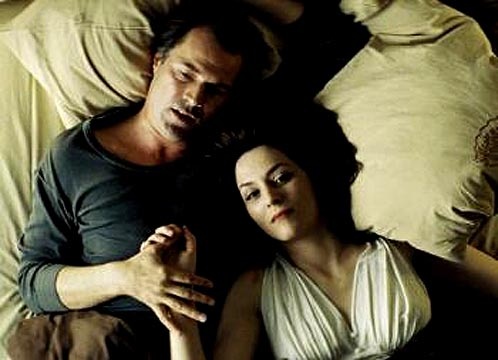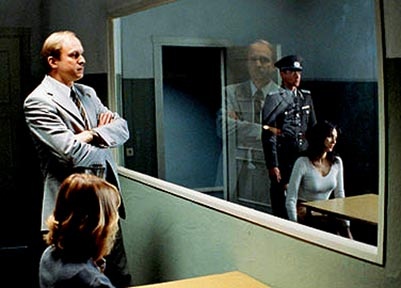The Lives of Others: A Personal Assessment
Life in the Formerly Divided Germany
By: Astrid Hiemer - Jan 17, 2008
Das Leben der Anderen (The Lives of Others)
Director/Writer: Florian Henckel von Donnersmarck
Producers: Max Wiedemann, Quirin Berg
Major Cast: Ulrich Muehe, Martina Gedeck, Sebastian Koch, Ulrich Tukur
Cinematography: Hagen Bogdanski
Editing: Patricia Rommel
Distribution USA: Sony Pictures Classics
Winner: Academy Award for Best Foreign Language Film, 2007
US Official website:
http://www.thelivesofothers.com/
One of our first Netflix movie choices "The Lives of Others" proved to be close to what our friend, Jan Nelson, declared as the best film she ever saw. She is not alone in her judgment. William F. Buckley, Jr., apparently wrote in his syndicated column, that at the end of the film: I turned to my companion and said, " I think that this is the best movie I ever saw."
The film has a way of lingering with me. Mostly, because, I am a German born US citizen with families in then both States, East and West Germany. I vividly recall first-hand reports by family-members, who were living in East Berlin for twenty years, and who were under Stasi observation and knew it. They were blacklisted professionally for many years, and spoke of families, they knew, where one member informed on another family member. We also heard about the experience of sitting in a former Stasi Office and reading ones files, where parts of pages were made unreadable, for fear of person to person retributions. We learned of a "Run on the Stasi Headquarter Offices," where many documents were destroyed by a mob, shortly after the Fall of the Berlin Wall. It was later established as having been organized by former Stasi members for exactly that purpose. I learned in a recent telephone conversation with my family that many people, who experienced the oppressions of the State and the Secret Police, did not want to see the film. Quite understandable, the past is still too recent. The main actor, Ulrich Muehe, who has died of cancer, was a highly regarded Theatre- and Film actor, and the film received many awards in Germany, Europe, and around the world. So, what is the film, "The Lives of Others" about?
East Berlin, 1984, Hauptmann Gerd Wiesler (Ulrich Muehe), a Secret Police Officer of the "Stasi" is ordered by his boss, Oberstleutnant Anton Grubitz (Ulrich Tukur) to listen in on every telephone- and personal conversation of the prominent playwright, Georg Dreyman (Sebastian Koch) and his love, the actress, Christa-Maria Sieland (Martina Gedeck).The Stasi was an equivalent of the CIA. In the former East German (so called) Democratic Republic (GDR/DDR) it was also the internal Secret Police. The apartment receives freshly activated microphones and two Stasi officers are stationed in the attick, above their apartment. Wiesler gets more and more drawn into their lives. He admires Christa Sieland's work on stage, and becomes disillusioned by his assignment to find subversive cause against the couple. Did he believe in the Communist State? I don't know, but he makes moral choices.
The Minister Bruno Hempf (Thomas Thieme) had pressured the actress into an affair by means of his political position. Wiesler's own boss paints the "positive" ending of the assignment as a stepping stone in both their careers. He is to hear information that exposes the playwright as an "enemy of the state." When an article in the West German magazine "Der Spiegel" appears, which documents the high suicide rate in the GDR/DDR and particularly among blacklisted creative people, Dreyman, the writer, is fingered for the report. Stasi Man,Wiesler, must find the location of the type-writer that was used to compose the article, an unknown model. Instead, he suppresses information and removes the type-writer from the apartment before the search unit arrives. Crista Sieland, who has been arrested, then let go after she gives up the hiding place, a space under the floor boards, while being intensely interrogated and threatened to end her career. She is overcome by guilt, when the Stasi searchers arrive. She runs from the apartment and in front of a passing truck and dies in her lover's arms.
Wiesler, the Stasi Man, is not trusted any longer and gets demoted to a position to open confiscated mail for the next four years, until he and his co-workers hear of the Fall of the Berlin Wall on the radio.
Then, the viewer sees the playwright, G. Dreyman, reading the last of his extensive Stasi files at the former Headquarters. He realizes that agent "HGW XX/7" had not exposed him and Christa Sieland. He asks for and receives the identity of the now civilian man, a newspaper deliverer. He actually looks him up, but only watches him from a taxi, while Wiesler is walking his paper route.
Two years later Georg Dreyman has published a novel titled "Sonata for a Good Man." (Also the title of a music piece in the film, which signifies the transformation of the agent.) He dedicated his book "To HGW XX/7," with gratitude. Gerd Wiesler, by chance, walks by a book store, picks up the volume, and reads the dedication. He purchases the book. It does not need to be gift wrapped. The book is for him.
The film received the 2007 Academy Award for best Foreign Language Film. The German Film Awards of 2006 awarded the film in seven major categories. (The organizers of the Berlin Film Festival, however, declined to accept the film in 2005 as an official entry, still reluctant to confront East Germany's horrible past.) Again, the film received many other awards and nominations.
In fact, the film is spellbinding, a finely developed plot. The collective acting is superb, understated. And it is probably the best film work of Ulrich Muehe, (now deceased) the major character, the Stasi Man. The prominent playwright, Georg Dreyman, supported for his work by the State, supposedly did not think that he also may be or has ever been under surveillance, which is unlikely. And was there ever a Stasi operative, who would have dared to go against his orders? I don't know. He is a fictional character. I do know, that there were millions of morally upright people living in the GDR/DDR, as we universally understand it, who did the right thing every day, and when put to the test.
I have read a good number of excerpts of reactions from the US press. I have yet to find anyone, who has drawn parallels to the current climate in the US, under the Homeland Security Act, and telephone surveillance of US citizens without Court Orders. Yes, elections in the US are underway. There are political offices, organizations, members of the press, and plain citizens, working to keep balance for what the Government in a free country at War can and cannot take away from its citizens' rights.
This film still deserves a much wider audience. America, view "The Lives of Others."






